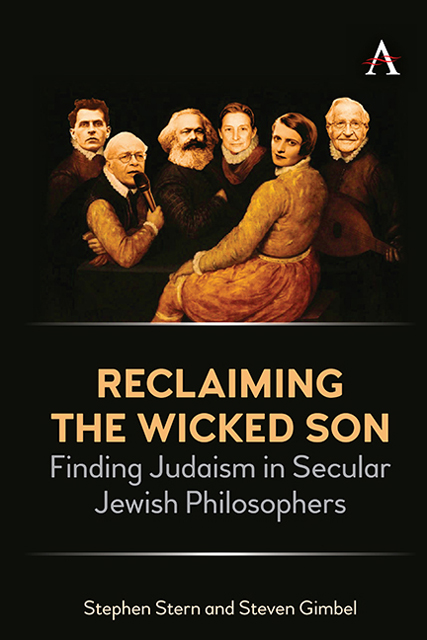Book contents
- Frontmatter
- Dedication
- Contents
- Introduction: Reclaiming the Wicked Son
- 1 Karl Marx and Materialistic Messianism
- 2 Ludwig Wittgenstein and Neo-Talmudic Thought
- 3 Ayn Rand and the Hassidic Courts
- 4 Peter Singer: The Amos of Anim
- 5 Judith Butler and Orthopraxy
- 6 Noam Chomsky, Kabbalist
- Conclusion: Re-Membering the Tribe
- Bibliography
- Index
3 - Ayn Rand and the Hassidic Courts
Published online by Cambridge University Press: 10 January 2023
- Frontmatter
- Dedication
- Contents
- Introduction: Reclaiming the Wicked Son
- 1 Karl Marx and Materialistic Messianism
- 2 Ludwig Wittgenstein and Neo-Talmudic Thought
- 3 Ayn Rand and the Hassidic Courts
- 4 Peter Singer: The Amos of Anim
- 5 Judith Butler and Orthopraxy
- 6 Noam Chomsky, Kabbalist
- Conclusion: Re-Membering the Tribe
- Bibliography
- Index
Summary
The most important structural change to Judaism after the diaspora is the development of the reform, orthodox and conservative movements in nineteenth-century Europe. As reactions and counter-reactions to the developments of science, culture and politics of the time, these movements regularized distinct forms of Jewishness, each with their own practices and belief structures. They became corporate brands of Judaism, opening franchises in each community. Congregations became consumers with brand loyalty. Rabbis became managers and assistant managers, trained at approved Yeshivas in the specifics of corporate policy so as to satisfy the customers.
These divisions, and further ones that would follow, radically reshaped not only Jewish life moving out of the nineteenth century, but Judaism itself. It turned Judaism from a way of life for members of a nation into an organized religion for a set of believers. In this way, Judaism entered the same category as Christianity and Islam. It was now a flavor of faith with an associated metaphysics and ethics that could be compared and contrasted. This allowed Christianity not only to be a dominant religion, but also to define what it means to be a religion.
So overwhelming are the changes that came with the partitioning of Judaism, that little time is spent making sense of what was lost in seeking the economy of scale that comes with corporatization. The place to look are the Hassidic courts of central and eastern Europe in the eighteenth and nineteenth centuries. Rabbis were wise men and seers, not mere customer ser vice representatives. They were scholarly entrepreneurs, each building and selling his own brand of Judaism, hustling and innovating, making Judaism dynamic.
The virtue of this approach was enunciated in a place one would not expect, the works of Ayn Rand. A secular thinker of Jewish heritage, Rand's objectivism is thoroughly committed to eliminating anything mystical or supernatural, exactly that upon which the Hassidic worldview is based. Yet, the content of Rand's beliefs, her picture of epistemic growth, the mechanism by which we come to gain understanding in the world, turns out to be exactly the same. Committed to the Enlightenment notion of a marketplace of ideas, human progress requires great individuals who transcend the moment, who yield to nothing but the creative spirit, who lead through the force of their individual greatness.
- Type
- Chapter
- Information
- Reclaiming the Wicked SonFinding Judaism in Secular Jewish Philosophers, pp. 45 - 56Publisher: Anthem PressPrint publication year: 2022



